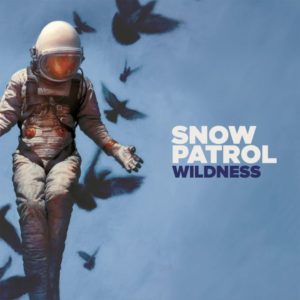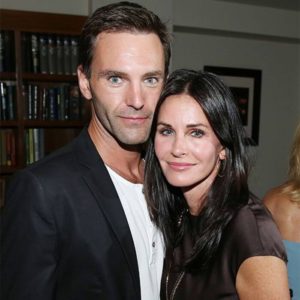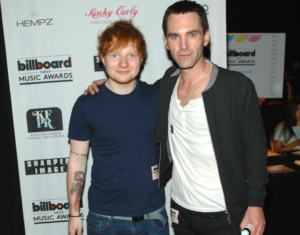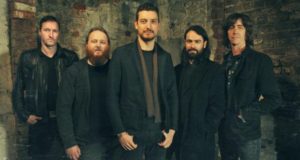Interview: Snow Patrol’s Johnny McDaid: “Tire Marks On The Soles Of Our Shoes”
With the recent announcement that Snow Patrol will be performing an acoustic show in Auckland at the ASB Theatre on August 8th, The 13th Floor got in touch with the band to find out what to expect.
Its been over a decade since Snow Patrol were last in Auckland, and since then they’ve added a new member, keyboard player Johnny McDaid. In addition to his keyboard skills, McDaid has made a name for himself writing hit songs with the likes of P!nk and Ed Sheeran. He also has made headlines by dating Courtney Cox.
So, listen in as The 13th Floor’s Marty Duda tracks down Johnny McDaid as the band tours the US and discusses Snow Patrol’s return to the road and how it affects his own songwriting.
Click here to listen to the interview with Snow Patrol’s Johnny McDaid:
Or, read a transcription of the interview here:
MD: The band is on the road, though, right?
JM: The band is on the road. We are weary of it – there are tire marks on the soles of our shoes.
MD: You’ve been on the road for like, over a year, now, right?
JM: 16 months, I think, now we’re at? Yeah, it’s been a while. You’d think we would’ve gotten used to it by now, but that never happens.
MD: I can imagine, that seems like a long time. And of course, you took a break from like, 2013 ‘til, last year, so… was it tough to kind of get back into…speed? On that?
JM: U-um, yeah! Absolutely, but there was definitely a moment where we…. in terms of playing together live, where we went back into the rehearsal studio and it kinda clicked in a way that’s very difficult to explain. Where it just feels like, something that just works. Um, and it sort of fits together in a way that is such the DNA of the band. And so even though we were apart for a long time, what happens when we’re together is really special, and it sort of finds its way to the surface quite naturally.
MD: Right. And so, how have the shows been going in the States, there?
 JM: The shows have been great! Really, really great, and… kind of evolving all the time. You know, they’re – I think when you tour and tour and tour, it’s a bit like growing up with a child. You don’t notice they’re getting taller when you’re standing next to them, but suddenly when you put a mark in the door post and you put their head to it… after 16 months in this case, you see how much they’ve grown. And I think that happens with bands, when you’re on the road, constantly, iteratively evolving. And we’ve been finding that the crowds have been coming along and singing the new songs, which is always really inspiring when you put out a new record, and you’ve been away for so long, and people are coming along requesting new songs – and singing the words of new songs – that’s a great thing.
JM: The shows have been great! Really, really great, and… kind of evolving all the time. You know, they’re – I think when you tour and tour and tour, it’s a bit like growing up with a child. You don’t notice they’re getting taller when you’re standing next to them, but suddenly when you put a mark in the door post and you put their head to it… after 16 months in this case, you see how much they’ve grown. And I think that happens with bands, when you’re on the road, constantly, iteratively evolving. And we’ve been finding that the crowds have been coming along and singing the new songs, which is always really inspiring when you put out a new record, and you’ve been away for so long, and people are coming along requesting new songs – and singing the words of new songs – that’s a great thing.
MD: Yeah. Was there a bit of trepidation with the band, having been away so long? I know there was quite a bit of time in between records, when it finally came out last year. So… what was the vibe – the feeling of the group, kinda dipping your toe back in and seeing… what the audience was like at that point?

JM: That’s a really good question, because there was trepidation until… about, two bars into the first song that we played live, when we did our first show. And then… we all kind of looked at each other, and went, “Oh. Okay. This is fine, it’s good, makes sense…” and the trepidation might be – it’s been a long time since the tour’s been in the water, and it’s wonder more than anything else. It’s not so much hesitation, as wonder, as in, “I’m curious if people still resonate – if people still want to see us, still want to come,” Um, and luckily, it looks like the answer’s yes.
MD: Now, you guys are gonna do an acoustic show, here in Auckland, later in the year. So…to kind of bring us up to speed, why are you doing an acoustic? What was kind of the process to get to that point of deciding to do something like that?
JM: So, the idea of it being an acoustic show is our way of saying – um, it’s not the full band, it’s three of us – Nathan [Connolly], Gary [Lightbody], and I. And it’s also more than just an acoustic show, in the sense that, we built this system, this performance system if you like, where I can trigger beats and lots of sines and stuff, and it’s much more – we’re not just busking through songs. What we hope to do is give a proper show, but , unfortunately we don’t have Pavs [Paul Wilson] and Jonny [Quinn] there, but it gives us a way for us to be able to tour, and to be able to go everywhere with the songs, really, and still give people the experience of coming to a Snow Patrol show. And I think it’s a really exciting show. It’s actually really dynamic, and… you never know what’s going to happen. Because we can throw songs in on the fly, and we often take requests and, […] on stage every now and again, you know, it’s a really fun environment. For the three of us, we do a lot of this stuff together, promo, tours, and… it’s a really fun way to go off-piste a bit. Hopefully people will experience that and see that it’s uh, it’s all about the room.
MD: Right, right. I can imagine that it’s gonna be a much more intimate experience. I think the last time that Snow Patrol was in Auckland, was back in 2007. Which was probably before you were involved with the band, and it was in a big arena.
JM: About a year before, yeah.
MD: So, uh – and I don’t think you guys – have you been to New Zealand before? Have you played here? Personally?
JM: I haven’t – no, this will be my first run.
MD: So, it’s a long time, there.
JM: I cannot wait. I cannot wait. I mean, it’s one of those things that people say about Ireland a lot, “Oh, I’ve always wanted to go,” and I say that about New Zealand a lot. So, now I get to actually do it.
MD: Yeah, it’s a good place to be. So, how is the set-list going to be affected by the fact that it’s an acoustic thing with three of you? You mentioned…touched on it a little bit, but you must go in thinking “Oh, we can do this, but we can’t do that, or maybe we want to try something else.” How do the three of you –
JM: It actually allows us to be much more free, oddly, because we can kind of wing it, and do stuff on the fly, in a way that – because it’s not attached to the bigger production, um, you know, because when we play normally, we have our set-list normally well-mapped out. I mean, every now and then there’ll be a curveball or we’ll throw something in, but generally, because everything’s attached to production, there’s an art to the set-list, there’s a flow for the visuals, there’s a flow for the dynamic of the… the way it goes, really. And when we’re doing the acoustic stuff, it tends to be a little more “You wanna try this? Okay, we’ll try that.” Or someone holds up a sign and we’ll go, “Do you know the chords to this one? Nope? Okay, ooh, we’ll try it anyway.” So it’s a little freer in that way, and also the arrangements can be much more dynamic. It’s not attached to anything except the three of us on stage. And we just kind of look at each other, and have this sort of body language between us as to when things might happen or go on. And you – you feel very, it’s very liberating, actually. It doesn’t replace – it’s just different from the full band live show. There’s nothing like the five of us playing on stage together, for sure. That has its own specialness about it. It’s just that we get to sort of… move off, and do something different. It’s pretty exciting.

MD: So this must be very different – the kind of, last year and a half, a very different lifestyle than say, your previous four or five years, where you were more… I’m assuming, focusing on songwriting. I mean, you’d written with Ed Sheeran, and P!NK, and all these folks, and now suddenly you’re in a band on the road! How was it for you to have to make that change in what you do? Was it a major shift, or was it a natural thing?
JM: I mean, it’s a major shift in the sense that….there’s – less frequency of the same place, and… just a general atmosphere of being on tour. Um, regardless of what you do in your other time when you’re not on tour. It’s a shift to get your head around, and your body, and… your mind. But I still bring a studio on the road, and when we have time off, on tour, I play off and I keep making records. So, I’ve been able to do it – I mean, limited in my time [that] I can do that now, the way we’re on tour, um… but, you know, it’s something that’s really important to me, and the guys know it’s something important to me. And hopefully, I bring something of it, to the band. If we’re altered by everything we do, and… everybody we interact with or work with, then hopefully that way of being altered is something I can bring…to the band. The same thing happens when Gary works with Tired Pony, or when he writes songs with people, yeah, he brings something back. It’s not that we go out and do these things and then, nothing. We come back, hopefully fuller.
MD: Right.

JM: So, [Nathan] made Little Matador, which is a great record he made in the, in the interim, so it’s just an important facet of who we all are as individuals, because we’re in a band, we are one, but we’re also five human beings, with separate bodies and separate minds.
MD: Right, because the impression I get, is that when you joined the band you were hired kind of as a… keyboard player, and since then you’ve become this notable songwriter, and I’m wondering if that changed the dynamic or how you were perceived in the band, and what was expected of you when you – when you guys finally recorded the album and got it out last year.
JM: Um. I-It’s. A… Again, that’s a very insightful question, really, and a deep one. It feels like we should be talking about psychology today, and not about music…
MD: Sorry.
JM: …It’s a good psychology plug. Um, you know… My – my work outside the band, and in the band, has definitive edges to it. My joining the band was kind of osmotic. It happened because we were friends, and we’d been playing together since, probably 2007, when I started playing with the band, and then… slowly it became more integral, for me and the rest of the guys. And you don’t really notice it happening, it’s like falling in love with your roommate. You know, you’re roommates one day and you share a sink, and… a year later you still share a sink, but you declare that you’re in love. There’s – and there is commonalities to both states, but in terms of defining my role in the band, my role in the band is so different to my role with the artists that I work with outside the band. Entirely different. My prime ordinant when I work with artists is that I write songs with them, and I write lyrics and melodies with them, and that’s not what I do in Snow Patrol, at all.
My role in Snow Patrol is to support Gary, in finding his way to a song, and… if he has a song, then finding a way to present that song live, the best it can be. So it’s a very different role. It’s like being either a bus driver, or a… or an astronaut.
MD: So what happens with your songwriting that goes to other artists, when you’re consumed with being on the road with Snow Patrol?
JM: Well, there’s less of it, for a start, because we’ve less time. But it’s still very important to me, and it’s something that I… I keep the flame… alive, I bring a studio on the road with me. Gary and I still write when we’re on the road, we…. have breaks. You know, a week here, a week there, a couple of days here, a couple of days there, and I think on the last American tour every single day off I had, I flew somewhere and did a writing session, so I still managed to make a lot of records last year. So, I was on the road for about 90% of the time, it just means that the 10% of the time I have left becomes more precious.
MD: Yup.
JM: And I have to pick and choose what I do and with whom I do it.
MD: Yup.
JM: And so it doesn’t stop. It changes, and it’s less frequent, but it’s still alive.
MD: …Perhaps you can just touch on, briefly – since we only have a minute or so – what your process is like writing with these other people. How does that work for you?
JM: It’s really difficult to disseminate it and turn it into words, but it’s something along the lines of…asking who they are, where they are, what they wanna say, and then figuring out a way to say it musically. It’s not to go in with any sort of proscriptive idea, like “what it should be”; allow it to be what it wants to be. And I know that sounds abstract, but it is an abstract process, and one that I really honour. I think it’s fair, a really special thing that goes on. It’s kind of an alchemy that I don’t necessarily understand but I take part in.
MD: What makes it easy for you to work with somebody, as opposed to somebody who may be more difficult?
JM: I don’t – I don’t think of people as being difficult, I think of them as being human, and… so, I don’t really think of it as a binary thing. What makes the process flow, is when it’s trusted – so, most of my job is just about creating a space, where they trust to reach into themselves, and pull out something they didn’t know was there, or that they were scared to reach towards, or maybe that they didn’t ever reach towards it before because they didn’t think it was important. And discovering what’s important for ourselves amongst the mundane, or amongst the things that just stir our soul, is really what my work is about.
MD: Right. Interesting. So it sounds like you’re very supportive. No matter what you’re doing, you’re kind of helping other people. At some point, it sounds like you might wanna do your own thing, get your own voice out there.
JM: Well – my, my – you know, this is the thing about working with people. I know I don’t want to do something by myself. I’m by nature, I’m about community, I’m about working with people. I’ve come to discover that I function best when I am part of something that is greater than me. So stuff I do – I work with parts, and these amazing human beings, where I am more when I’m with them, than I am alone.